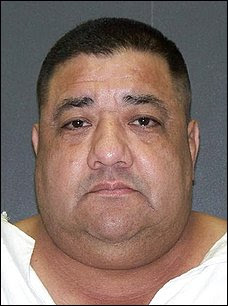Juan Melendez, an innocent man who spent more than 17 years on death row for a crime he did not commit, will be coming to Corpus Christi, Texas June 25-26 to attend the 2010 Texas Democratic Party State Convention and to speak at the meeting of “Democrats Against the Death Penalty” at 1 PM on Friday, June 25. The meeting will be in room 225 D-E of the American Bank Center. The party is expecting more than 5,000 delegates, alternates and guests to attend the state convention.
Juan is traveling to Texas with the assistance of Witness to Innocence, which is the nation’s only organization composed of, by and for exonerated death row survivors and their loved ones. These individuals are actively engaged in the struggle to end the death penalty, challenging the American public to grapple with the problem of a fatally flawed criminal justice system that sends innocent people to death row.
Members of Texas Moratorium Network started the “Democrats Against the Death Penalty” caucus in 2004. In 2008, more than 300 people attended the caucus meeting at the state convention. In 2004, the Texas Democratic Party endorsed a moratorium on executions in the party platform. In 2008, the Resolutions Committee at the state convention approved a resolution in support of abolishing the death penalty in Texas, but the resolution was not voted on by the floor of the convention before adjournment.
 Raised in Puerto Rico, Juan Melendez was working in Polk County as a fruit picker before he was sentenced to death in 1984 for the 1983 killing of an Auburndale beauty salon owner named Delbert Baker. A police informant implicated Melendez and another man. The second man cut a deal with prosecutors and testified against Melendez, but 12 years later, he recanted, saying he was coerced.
Raised in Puerto Rico, Juan Melendez was working in Polk County as a fruit picker before he was sentenced to death in 1984 for the 1983 killing of an Auburndale beauty salon owner named Delbert Baker. A police informant implicated Melendez and another man. The second man cut a deal with prosecutors and testified against Melendez, but 12 years later, he recanted, saying he was coerced.







 Let me tell you a bit about myself: I am a 48-year-old Mexican man. I have been on Death Row (D/R) for 14-years. (I first arrived on D/R in May 8, 1992) I have 4-children, and 9-grandchildren. I have my mother, four brothers and one sister. My father died when I was 15. I never did finish school. I quit school after my father died so I could work full-time and help my family. Work was not a stranger to me, as I had worked since a young child in the cotton fields, chopping cotton and picking cotton. We were poor so all of the family had to work so we could eat and survive.I have been thinking back on these past 14-years and I am trying to remember how many men have been executed, but it’s been so many that I have lost count? I know, at least, 250 men, some who were my friends, or most who I had met over the years. It was a sombre experience to be speaking to these men, knowing that in only a few days, sometimes the next day, they would be dead. Some accepted it, some didn’t. One man, whose image stays in my mind, I will never forget. As they were taking him out of our wing to be executed, he stopped at my cell to tell me “good-bye”. It was his eyes, his eyes were wide open with fear. I felt his fear (if that is possible to explain) it was so overwhelming. That, took place in 1997, and more than 5-years later, I still see his eyes
Let me tell you a bit about myself: I am a 48-year-old Mexican man. I have been on Death Row (D/R) for 14-years. (I first arrived on D/R in May 8, 1992) I have 4-children, and 9-grandchildren. I have my mother, four brothers and one sister. My father died when I was 15. I never did finish school. I quit school after my father died so I could work full-time and help my family. Work was not a stranger to me, as I had worked since a young child in the cotton fields, chopping cotton and picking cotton. We were poor so all of the family had to work so we could eat and survive.I have been thinking back on these past 14-years and I am trying to remember how many men have been executed, but it’s been so many that I have lost count? I know, at least, 250 men, some who were my friends, or most who I had met over the years. It was a sombre experience to be speaking to these men, knowing that in only a few days, sometimes the next day, they would be dead. Some accepted it, some didn’t. One man, whose image stays in my mind, I will never forget. As they were taking him out of our wing to be executed, he stopped at my cell to tell me “good-bye”. It was his eyes, his eyes were wide open with fear. I felt his fear (if that is possible to explain) it was so overwhelming. That, took place in 1997, and more than 5-years later, I still see his eyes My daughter Sabrina wrote to me 2-days ago! She hopes to be coming to visit me soon – which I am looking forward to seeing her again. It has been almost 2-months since I last saw her because she recently gave birth to my youngest Grandchild, Thomas. It has been even longer since I last saw her other 3-children). But they have to go to school so I can understand. And it is a long drive (4-hours) to this prison, from their home. Children can get “cranky” on long trips! But I do love speaking to them, as they have so many questions to ask, and so much love to give. Yet, they still don’t understand ‘why’ they cannot touch “Paw-Paw” (Grandpa) as we are always separated in the visit room by a thick glass. I too, wish I could hold them but we have to be content to press our fingers against the glass and somehow feel each other’s warmth through the glass – or imagine it. My other children have had 5 kids between them, so I have 9-grandchildren total. I saw two of the youngest in December 2001. I hope to also see them again soon.
My daughter Sabrina wrote to me 2-days ago! She hopes to be coming to visit me soon – which I am looking forward to seeing her again. It has been almost 2-months since I last saw her because she recently gave birth to my youngest Grandchild, Thomas. It has been even longer since I last saw her other 3-children). But they have to go to school so I can understand. And it is a long drive (4-hours) to this prison, from their home. Children can get “cranky” on long trips! But I do love speaking to them, as they have so many questions to ask, and so much love to give. Yet, they still don’t understand ‘why’ they cannot touch “Paw-Paw” (Grandpa) as we are always separated in the visit room by a thick glass. I too, wish I could hold them but we have to be content to press our fingers against the glass and somehow feel each other’s warmth through the glass – or imagine it. My other children have had 5 kids between them, so I have 9-grandchildren total. I saw two of the youngest in December 2001. I hope to also see them again soon.




